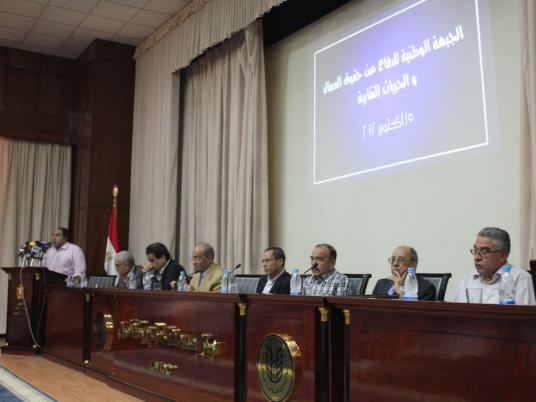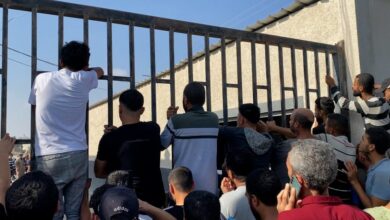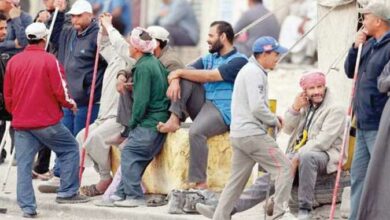
In a historic development, two independent workers’ groups and several political parties joined forces on Monday to establish the National Front for the Defense of Labor Rights and Union Liberties.
The goals of the front include the cancellation of the restrictive Trade Union Law 35/1976, the issuing of the draft Trade Union Liberties Law promoting workers’ right to free association, protecting unionists and laborers against punitive sackings, confronting labor violations perpetrated by the state and/or employers, and the establishment of a just pay-scale based on a determined minimum and maximum wage (of no more than 15 times the minimum).
At the core of this front are the country’s two largest independent workers’ groups — the Egyptian Federation of Independent Trade Unions (EFITU) and the Egyptian Democratic Labor Congress (EDLC). A host of left-leaning political parties have also joined, including the Egyptian Social Democratic Party, the Egyptian Communist Party, the Tagammu Party, the Karama Party, the Socialist Popular Alliance Party, the Constitution Party, the Adl Party, and the Egyptian Socialist Party, among other political movements.
Monday’s conference was introduced by Ahmad Hassan al-Borai, the former manpower minister, under whom the draft Trade Union Liberties Law was formulated.
The former minister announced, “This front is not only for confronting the vicious attacks on union rights, but also for the protection of basic labor rights and the realization of social justice.”
Borai added that his draft union law was prepared by September 2011, “yet remained a dead paper which was shelved and collected dust” under the rule of the Supreme Council of the Armed Forces, then at the hands of the People’s Assembly, and most recently at the hands of the new manpower minister, the Muslim Brotherhood’s Khaled al-Azhary.
According to Abdel Ghaffar Shokr, chief of the Socialist Popular Alliance Party, “Azhary seeks to get rid of the Trade Union Liberties Law and to merely make cosmetic changes to Law 35.”
Borai concluded by saying he hopes to see his Trade Union Liberties Law issued, and that he hopes to witness “one unified independent federation” emerge via the unification of the EFITU and EDLC.
While participants declined to mention the aggregate number of union members between the EFITU and EDLC, estimates suggest that their unification would amount to a membership of fewer than 3 million. The EFITU is by far the larger of these two workers’ groups, claiming a membership of nearly 2.5 million.
There are tens of recently established independent unions which are neither affiliated to the EFITU nor the EDLC.
Meanwhile, the state-controlled Egyptian Trade Union Federation (ETUF) still claims a membership of 4.5 million workers. The ETUF had monopolized the trade union movement in Egypt since its establishment in 1957.
The EFITU, which was established on the fifth day of the 25 January revolution, emerged from four independent unions which were founded between the years 2007-2011. These four unions included the Real Estate Tax Authority Employees Union, Independent Teachers Syndicate, the Egyptian Health Technologists Syndicate and the Pensioners Federation.
Following administrative disagreements, the Pensioners Federation broke away from the EFITU and joined the EDLC. The EDLC had emerged as a labor umbrella group shortly after the establishment of the EFITU. The backbone of the EDLC is the Center for Trade Union and Workers’ Services (CTUWS), a labor rights non-governmental organization. The EFITU, for their part, had objected to a non-governmental organization such as the CTUWS having rights within the organization equivalent to a union, to the CTUWS's receipt of funding from foreign trade union federations (including the US-based AFL-CIO), and to concerns that the CTUWS would act as an intermediary between workers and the authorities.
Kamal Abbas, chief board member of both the EDLC and CTUWS, clarified that future collaboration of the EFITU with EDLC could take one of two forms — either a unified independent trade union federation, or two different groupings with a common leadership council or steering committee.
Participants and panelists recommended the establishment of a joint committee of 10 board members — five from the EFITU and five from the EDLC. Abbas recommended that the merger process should be “carefully studied” and warned against “hastily rushing into the process.”
Kamal Abu Eita, president of the EFITU, commented, “Trade union unity must be voluntary and non-compulsory.” Abu Eita pointed out that affiliation to the state-controlled union federation was compulsory under the Mubarak regime, and must not be so after Mubarak.
Like Abbas, Abu Eita recommended “establishing either one unified federation, or one unified leadership council for the two different federations.”
Abu Eita urged voluntary unity among independent unions “to confront militias who attack protesting workers, and employers who punitively sack workers and unionists.”
“Nowadays we have more unionists who have been sacked, subjected to trials and unemployment than under the Mubarak regime,” he added.
“Thirty-three unionists are being interrogated by prosecutors for excising their right to strike,” Abbas said. “Azhary is fighting us on two levels. On the first level, he has been attacking independent unions claiming that we are illegitimate, while it is the ETUF which is actually illegitimate.”
“On the second level,” he continued, “he is attempting to control the ETUF. We are against party control over the ETUF. We cannot accept that the Freedom and Justice Party would take the place of its predecessor, the National Democratic Party, in dominating and manipulating this state-controlled federation.”
“Unions must be independent of the state and political parties. Unions must be democratically elected and accountable to their constituents.”




